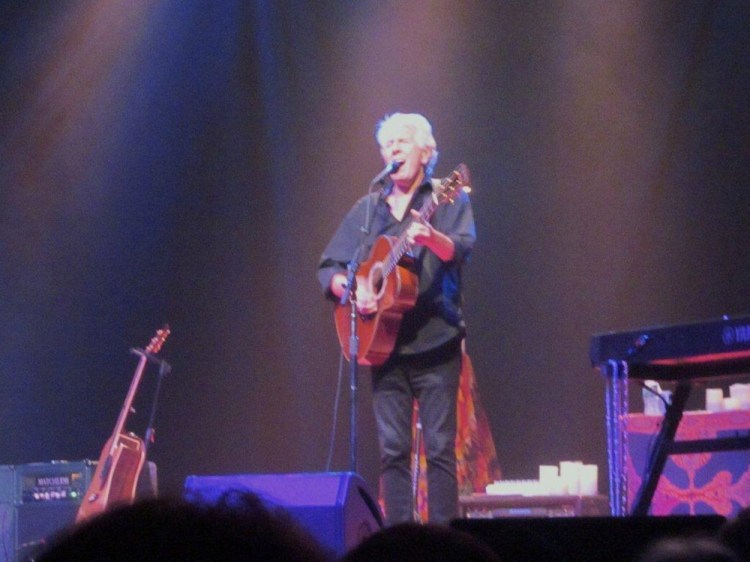Graham Nash, who first gained notice as a 1960s British rocker, offered songs old and new during an intimate and assured performance at the State Theatre in Portland on Sunday night.
Playing acoustic guitar, with accompaniment from Shane Fontayne on electric guitar, Nash reached way back for an opener of “Bus Stop,” a Hollies tune that instantly rang nostalgia bells with the large contingent of baby boomers in the crowd. The Blackpool-born singer-songwriter followed with “Marrakesh Express,” a tune with which he made his mark after joining Crosby, Stills and Nash.
Nash’s distinctive high tenor voice is still very much intact, and the connections between British and American traditions in his music continue to make for a pleasing overall sound, despite some tough subject matter.
Songs of protest about big government (”Immigration Man”), foreign misadventures (”Military Madness”), racial unrest (”Mississippi Burning”) and environmental peril (”Wind on the Water”) shared the set list with more personal reflections.
Among the latter were selections from Nash’s new album, “This Path Tonight,” his first in more than a decade. “Myself At Last” was particularly effective, with finger-picked guitar and harmonica from Nash fleshing out the tune about getting back on track as an individual. “Back Home,” which he dedicated to Levon Helm of The Band, was a touching reflection on mortality.
The white-haired 74-year-old referenced his new girlfriend and talked about former flame Joni Mitchell by way of introduction to “Our House,” written when he lived with Mitchell. “Teach Your Children” engendered a full-throated sing-along, particularly from the women in the audience.
With nearby candle-covered tables draped with patterned cloth and an electronic piano decorated with sparkling beads, the ambiance suggested a bygone era. As the singer discussed between songs, it was an era that included some wild times. “Cathedral” was introduced by way of his memories of a spaced-out day spent in the English countryside. Nash lamented that, without all the partying, he and his cohorts might have produced even more music.
Fontayne, who co-wrote some of the newer material with Nash, impressed on slide guitar and mandolin as well as on backup vocals. He shared the vocal lead on the Beatles’ “Blackbird.”
When Nash pounded the keyboard for a spirited take of his “Chicago,” still hoping through music to “change the world,” it was hard not to feel good about the fact that the man behind those words is still going strong.
Steve Feeney is a freelance writer who lives in Portland.
Send questions/comments to the editors.



Success. Please wait for the page to reload. If the page does not reload within 5 seconds, please refresh the page.
Enter your email and password to access comments.
Hi, to comment on stories you must . This profile is in addition to your subscription and website login.
Already have a commenting profile? .
Invalid username/password.
Please check your email to confirm and complete your registration.
Only subscribers are eligible to post comments. Please subscribe or login first for digital access. Here’s why.
Use the form below to reset your password. When you've submitted your account email, we will send an email with a reset code.